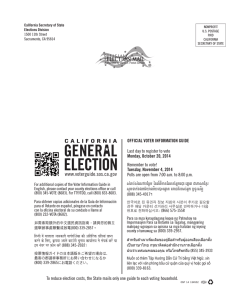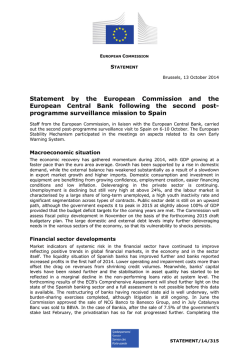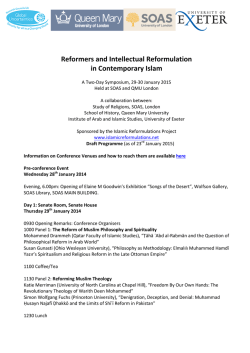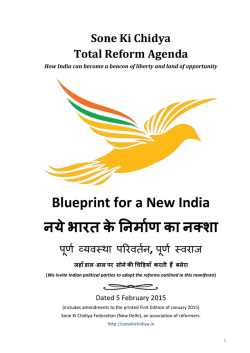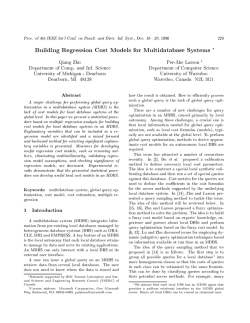
Draft Legislative Reform (Community Governance Reviews)
House of Commons Regulatory Reform Committee Draft Legislative Reform (Community Governance Reviews) Order 2015 Third Report of Session 2014–15 HC 969 House of Commons Regulatory Reform Committee Draft Legislative Reform (Community Governance Reviews) Order 2015 Third Report of Session 2014–15 Report, together with formal minutes Ordered by the House of Commons to be printed 28 January 2015 HC 969 Published on 30 January 2015 by authority of the House of Commons London: The Stationery Office Limited £5.50 Regulatory Reform Committee The Regulatory Reform Committee (previously the Deregulation and Regulatory Reform Committee) is appointed to consider and report to the House on draft Legislative Reform Orders under the Legislative and Regulatory Reform Act 2006. Its full remit is set out in S.O. No. 141, which was approved on 4 July 2007. Current membership Lee Scott MP (Conservative, Ilford North) (Chair) Heidi Alexander MP (Labour, Lewisham East) Mr David Anderson MP (Labour, Blaydon) Andrew Bridgen MP (Conservative, North West Leicestershire) Jack Dromey MP (Labour, Birmingham, Erdington) Richard Fuller MP (Conservative, Bedford) Lilian Greenwood MP (Labour, Nottingham South) Rebecca Harris MP (Conservative, Castle Point) Gordon Henderson MP (Conservative, Sittingbourne and Sheppey) John Hemming MP (Liberal Democrats, Birmingham, Yardley) Andrew Jones MP (Conservative, Harrogate and Knaresborough) Ian Lavery MP (Labour, Wansbeck) Andrew Percy MP (Conservative, Brigg and Goole) Valerie Vaz MP (Labour, Walsall South) The following members were also members of the committee during the parliament: James Duddridge MP (Conservative, Rochford and Southend East) Ben Gummer MP (Conservative, Ipswich) Brandon Lewis MP (Conservative, Great Yarmouth) Mr Robert Syms MP (Conservative, Poole) Criteria against which the Committee considers each draft legislative reform order Paragraph (3) of Standing Order No.141 requires us to consider any draft legislative reform order against the following criteria: … whether the draft legislative reform order — (a) appears to make an inappropriate use of delegated legislation; (b) serves the purpose of removing or reducing a burden, or the overall burdens, resulting directly or indirectly for any person from any legislation (in respect of a draft Order under section 1 of the Act); (c) serves the purpose of securing that regulatory functions are exercised so as to comply with the regulatory principles, as set out in section 2(3) of the Act (in respect of a draft Order under section 2 of the Act); (d) secures a policy objective which could not be satisfactorily secured by nonlegislative means; (e) has an effect which is proportionate to the policy objective; (f) strikes a fair balance between the public interest and the interests of any person adversely affected by it; (g) does not remove any necessary protection; (h) does not prevent any person from continuing to exercise any right or freedom which that person might reasonably expect to continue to exercise; (i) is not of constitutional significance; (j) makes the law more accessible or more easily understood (in the case of provisions restating enactments); (k) has been the subject of, and takes appropriate account of, adequate consultation; (l) gives rise to an issue under such criteria for consideration of statutory instruments laid down in paragraph (1) of Standing Order No 151 (Statutory Instruments (Joint Committee)) as are relevant; (m) appears to be incompatible with any obligation resulting from membership of the European Union. Publications The Reports and evidence of the Committee are published by The Stationery Office by Order of the House. All publications of the Committee (including press notices) are on the internet at www.parliament.uk/regrefcom. A list of Reports of the Committee in the present Parliament is at the back of this volume. Committee staff The current staff of the Committee are James Davies (Clerk), Jessica Montgomery (Second Clerk), Sonia Draper (Senior Committee Assistant) and Pam Morris (Committee Assistant). Contacts All correspondence should be addressed to the Clerk of the Regulatory Reform Committee, House of Commons, 14 Tothill Street, London SW1H 9NB. The telephone number for general enquiries is 020 7219 5469; the Committee’s email address is [email protected] Draft Legislative Reform (Community Governance Reviews) Order 2015 1 Contents Report Page 1 Introduction 3 2 Description of the draft Order 3 3 Assessment of the draft Order 5 A: Appropriate use of delegated legislation B: Removal of a burden C: Better regulation D: Legislative need E: Proportionality F: Public and private interests G: Necessary protection H: Existing rights and freedoms I: Constitutional significance J: Accessibilty of the law K: Consultation L: Issues relating to statutory instruments M: Compatibilty with membership of the European Union 4 5 5 6 6 6 6 7 7 7 7 7 7 8 Conclusion 8 Formal Minutes 9 List of Reports from the Committee during the current Parliament 10 2 Draft Legislative Reform (Community Governance Reviews) Order 2015 Draft Legislative Reform (Community Governance Reviews) Order 2015 3 1 Introduction 1. Draft Legislative Reform (Community Governance Reviews) Order 2015 (the ‘draft Order’) and Explanatory Document were laid before Parliament on 11 December 2014 by the Department for Communities and Local Government (the ‘Department’). 2. The Minister has recommended that the draft Order be subject to the affirmative procedure.1 2 Description of the draft Order Background 3. The draft Order would amend the Local Government and Public Involvement in Health Act 2007 (the “2007 Act”), which requires all local authorities in England to comply with regulations covering community governance reviews—the process that allows for the creation of new town and parish councils. According to the Department, the intention of the draft Order is to “remove the bureaucracy that frustrates and hinders many local campaigners” in calling for such reviews while retaining “the elements of the legislation that currently prevent the risk of councils being set up where there is insufficient support”. 2 4. The draft Order would make three changes to the 2007 Act. Lowering the threshold of signatures required to make a valid petition from 10 per cent to 7.5 per cent; 3 5. Lowering the threshold would reduce the percentage of local government electors required to sign the community governance petition, to trigger a review. The Department’s original consultation proposed a reduction from 10 per cent to 5 per cent. However, in light of the responses to that consultation, the Department now proposes a 7.5 per cent threshold. The Department has concluded that this modification would provide a better balance between “improving local democracy” and “maintaining the necessary protections”.4 In terms of the protections, the Department is clear that the existing safeguards in the 2007 Act would be retained.5 In particular, it highlights the fact that provisions under section 79 of the Act 2007—which establish the local authority’s role in making the final decision on whether a parish council should be established—are unaffected by the draft Order.6 1 Explanatory Document, para 47 2 Explanatory Document, para 2 3 Explanatory Document, page 6 4 Explanatory Document, para 18 5 Explanatory Document, para 19 6 Explanatory Document, para 19 4 Draft Legislative Reform (Community Governance Reviews) Order 2015 Shortening the amount of time the local authority can take to complete a community governance review 7 6. At present, the principal council must complete a review within 12 months of the day that the review begins. The draft Order proposes to reduce this to 12 months from the date of receipt of the petition or application.8 The intention is to “speed up the process and grant a degree of certainty for local campaigners”.9 7. The Department argues that the new timetable provides both local authorities and local campaigners with a “clearly defined timeline”10 and that local campaigners would have the assurance needed to coordinate effective and sustainable campaigns. Furthermore, the Department asserts that the time limit proposed is “realistic to allow for local authorities to complete even the most complex of reviews”.11 Allowing Neighbourhood Forums to trigger a community governance review 12 8. At present, a Neighbourhood Forum set up under Regulations is required to obtain signatories for a petition for a new council, even if the Forum has secured support for a neighbourhood plan. The draft Order would enable a Neighbourhood Forum (which has agreed a neighbourhood development plan), the right to submit an application for the creation of a new parish. This power would remove the repetitive elements that require campaigners to complete two separate consultation processes to evidence support for their proposals for the future of the community.13 9. The Department argues that the proposed change recognises that “the current requirement that forums with an agreed plan must still submit a petition to trigger a review is onerous and unnecessary”.14 It goes on emphasize the fact that the change “only gives the forum the ability to instigate a review if it achieves the required threshold” and did not “in itself make the establishment of a town and parish inevitable”. 15 Other amendments 10. In order to support Local Government in the implementation of these changes, the Department has undertaken to revise and strengthen the existing joint DCLG and Local Government Boundary Commission guidance on Community Governance Reviews. 7 Explanatory Document, page 7 8 Explanatory Document, para 20 9 Explanatory Document, para 20 10 Explanatory Document, para 22 11 Explanatory Document, para 22 12 Explanatory Document, page 8 13 Explanatory Document, para 23 14 Explanatory Document, para 25 15 Explanatory Document, para 25 Draft Legislative Reform (Community Governance Reviews) Order 2015 5 11. DCLG and Local Government Boundary Commission Guidance are currently working together to revise the guidance to set out the process for applying the new measures. This will involve a “coordinated approach taken by DCLG and the Commission” to ensure that the guidance is updated at appropriate milestones to reflect “future changes to legislation”.16 Central Government support for New Burdens for local authority community governance reviews 12. The Government has also committed to provide support for local authorities subject to conducting community governance reviews as a result of the new measures. The provision of the central fund will mean that local authorities subject to increased petitions will not incur any additional costs as a result of the new measures. 17 3 Assessment of the draft Order 13. Our role is to assess whether the proposals meet the statutory conditions required of an order under the Legislative and Regulatory Reform Act 2006 (the “2006 Act”), and to examine the proposals against a number of tests. Standing Order No.141 sets out the criteria under which the Committee makes that assessment. In this section we assess the draft Order against those criteria. A: Appears to make an inappropriate use of delegated legislation 14. The draft Order does not make an inappropriate use of delegated legislation and therefore does not raise any issues in respect of this test. B: Serves the purpose of removing or reducing a burden, or the overall burdens, resulting directly or indirectly for any person from any legislation (in respect of a draft order under section 1 of the Act) 15. A burden is defined in s1(3) of the 2006 Act as any of the following: a financial cost; an administrative inconvenience; an obstacle to efficiency, productivity or profitability; or a sanction, criminal or otherwise, which affects the carrying on of any lawful activity. 16. In its Explanatory Document, the Department sets out the process by which either a local authority or local campaigners can trigger a review in order to create a new town or parish council.18 The Cabinet Office White Paper Open Public Services had found that the 16 Explanatory Document, para 27 17 Explanatory Document, para 28 18 Explanatory Document, paras 5–9 6 Draft Legislative Reform (Community Governance Reviews) Order 2015 existing legislation for triggering a review “placed unnecessary burdens on campaigners”,19 and the Department argues that the current requirements: • were too demanding for campaigners to meet the “unrealistically high” requisite number of electorate signatures required to demonstrate support to trigger a review; • that the timetable allowed for the principal councils to complete the review was too long and made it difficult for campaigners to “maintain the momentum necessary to sustain support over a prolonged period of time”; and • that it failed to recognise the status Neighbourhood Forums have within their communities, particularly where the forum has had its neighbourhood development plan passed by the community in a referendum. 20 17. The Department argues that the removal of these burdens would “improve the experience for local communities and campaigners alike, making it easier for them to take the first steps towards setting up a town or parish council”. 21 18. While we accept the Government’s position that these represent burdens as set out in the 2006 Act, we note that the House of Lords Delegated Powers and Regulatory Reform Committee has questioned the extent to which the Department’s explanatory document has fully addressed the burdens test. In doing so, that Committee has recommended the Super-affirmative procedure in order to give the Department time to further clarify its position. C: Serves the purpose of securing that regulatory functions are exercised so as to comply with the regulatory principles, as set out in section 2(3) of the Act (in respect of a draft order under section 2 of the Act) 19. The draft Order does not raise any issues in respect of this test. D: Secures a policy objective which could not be satisfactorily secured by non-legislative means 20. The Department states that “no non-legislative solution is possible”22 and that amending the 2007 Act is therefore necessary. We conclude that this requirement has been satisfied. E: Has an effect which is proportionate to the policy objective 21. We agree that the effect is proportionate to the policy objective. 19 Explanatory Document, para 11 20 Explanatory Document, para 12 21 Explanatory Document, para 13 22 Explanatory Document, para 40 Draft Legislative Reform (Community Governance Reviews) Order 2015 7 F: Strikes a fair balance between the public interest and the interests of any person adversely affected by it 22. We agree that this requirement has been satisfied. G: Does not remove any necessary protection 23. The Department states that no protections will be removed as a result of the draft Order: In order to be valid, a petition or application for a community governance review will still require a strong degree of local support. A council will still have an adequate time period to consider all submitted proposals and conduct any review. No changes have been made to the ability of a council to determine what recommendations to make in the best interests of the community as a whole.23 24. We conclude that the draft Order does not remove any necessary protections. H: Does not prevent any person from continuing to exercise any right or freedom which that person might reasonably expect to continue to exercise 25. The draft Order does not raise any issues in respect of this test. I: Is not of constitutional significance 26. The Department confirms that the proposals are not of constitutional significance. J: Makes the law more accessible or more easily understood (in the case of provisions restating enactments) 27. The draft Order does not raise any issues in respect of this test. K: Has been the subject of, and takes appropriate account of, adequate consultation 28. The Department states that it has undertaken “extensive engagement throughout the local government sector” regarding the proposals. A formal consultation ran from October 2012 to January 2013 which considered a wide number of proposals to amend the 2007 Act. This was followed by a further formal consultation which ran from March 2014 to May 2014. That consultation contained proposals which had been modified in light of responses to the previous consultation.24 29. We conclude that the draft Order has been subject to adequate consultation. 23 Explanatory Document, para 45 24 Explanatory Document, paras 53 and 54 8 Draft Legislative Reform (Community Governance Reviews) Order 2015 L: Gives rise to an issue under such criteria for consideration of statutory instruments laid down in paragraph (1) of Standing Order No. 151 (Statutory Instruments (Joint Committee)) as are relevant 30. The draft Order does not raise any issues in respect of this test. M: Appears to be incompatible with any obligation resulting from membership of the European Union. 31. The draft Order does not raise any issues in respect of this test. 32. We conclude that the draft Order meets the required preconditions and tests. 4 Conclusion 33. We conclude that a satisfactory case has been made in favour of the proposals and recommend that the draft Order be approved. However, the House of Lords Delegated Powers and Regulatory Reform Committee has recommended the Super-Affirmative procedure, and requested further information from the Department. The draft Order therefore cannot be proceeded with until the Department has responded to the House of Lords Committee’s request. Draft Legislative Reform (Community Governance Reviews) Order 2015 9 Formal Minutes Wednesday 28 January 2015 Members present: Lee Scott, in the Chair Rebecca Harris Ian Lavery Andrew Percy Draft Report (Draft Legislative Reform (Community Governance Reviews) Order 2015), proposed by the Chair, brought up and read. Ordered, That the draft Report be read a second time, paragraph by paragraph. Paragraphs 1 to 33 read and agreed to. Question put, That the Report be the Third Report of the Committee to the House. Resolved, That the Report be the Third Report of the Committee to the House. Ordered, That the Chair make the Report to the House. [Adjourned till a date and time to be fixed by the Chair. 10 Draft Legislative Reform (Community Governance Reviews) Order 2015 List of Reports from the Committee during the current Parliament Session 2014–15 First Report Draft Legislative Reform (Patents) Order 2014 HC 331 Second Report Draft Legislative Reform (Entertainment Licensing) Order 2014 HC 742 Third Report Draft Legislative Reform (Community Governance Reviews) Order 2015 HC 969 First Report Draft Legislative Reform (Regulation of Providers of Social Work Services)(England and Wales) Order 2013 HC 270 Second Report Draft Legislative Reform (Payments by Parish Councils, Community Councils and Charter Trustees) (England and Wales) Order 2013 HC 929 Third Report Draft Legislative Reform (Overseas Registration of Births and Deaths) Order 2014 HC 1010 Fourth Report The Harrogate Stray Act 1985 (Tour de France) Order 2014 HC 1197 Fifth Report Draft Legislative Reform (Clinical Commissioning Groups) order 2014 HC1224 First Report Draft Legislative Reform (Annual Review of Local Authorities) Order 2012 HC 158 Second Report Draft Legislative Reform (Constitution of Veterinary Surgeons Preliminary Investigation and Disciplinary Committees) Order 2013 HC 824 First Report Draft Legislative Reform (Civil Partnership) Order 2010 HC 595 Second Report Draft Legislative Reform (Epping Forest) Order 2011 HC 963 Third Report Draft Legislative Reform (Industrial and Provident Societies and Credit Unions) Order 2011: Second Stage Session 2013–14 Session 2012–13 Session 2010–12 HC 1564
© Copyright 2026

